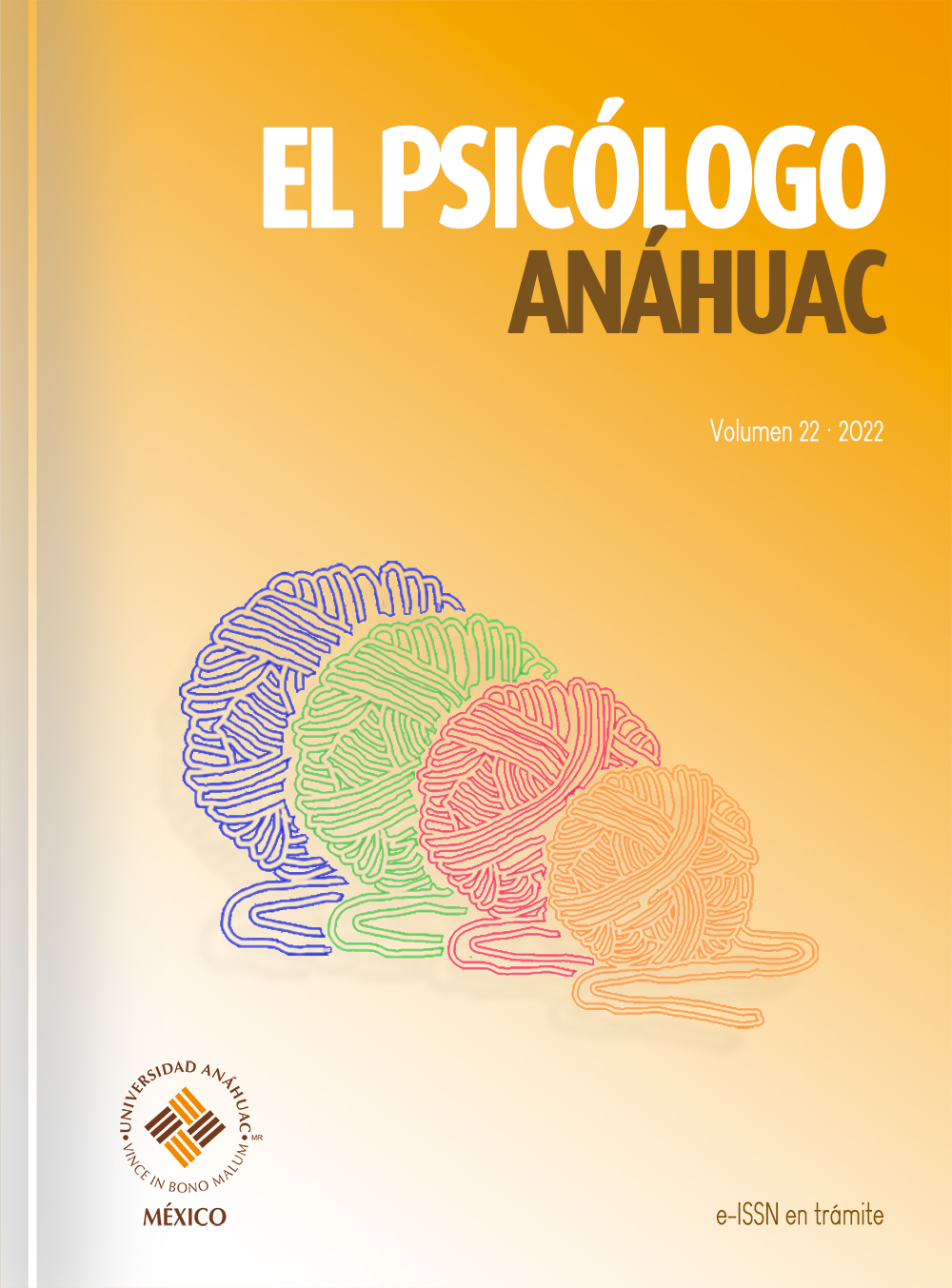Evidence of validity of the Achievement Emotions Questionnaire (AEQ) with a sample of Mexican high school students
DOI:
https://doi.org/10.36105/psic_anah.2022v22.03Keywords:
achievement emotions, self-report, measurement, adolescentsAbstract
The present study aimed to explore the pertinence of using the English scale called Achievement Emotions Questionnaire, which measures achievement emotions, with Mexican high school students, to assess the emotions they experience when doing math activities. As a first step, a Spanish translation of the scale was located. Subsequently, the Spanish translation was adapted to the language of Mexican high school students and applied to a sample of 354 adolescents aged between 13 and 16 years. Items of the Achievement Emotions Questionnaire (CEL-Mex, for its initials in Spanish) were grouped into three dimensions: negative activating emotion, negative deactivating emotion and positive emotion. The reliability of the full scale was .89, while Chronbach's alpha indexes of the subscales were .88 and .80. The adjustment indices of the Confirmatory Factor Analysis (GFI, CFI and RMSEA) were adequate. The data above indicates that CEL-Mex can be used with confidence to assess the positive and negative emotions of Mexican high school students.
Downloads
References
Artino, A., & Jones, K. (2012). Exploring the complex relations between achievement emotions and self-regulated learning behaviors in online learning. The Internet and Higher Education, 15(3), 170-175. https://doi.org/10.1016/j.iheduc.2012.01.006
Artino, A., La Rochelle, J., & Durning, S. (2010). Second-year medical students´motivational beliefs, emotions, and achievement. Medical Education, 44(12), 1203-1212. https://doi.org/10.1111/j.1365-2923.2010.03712.x
Calkins, S. D., & Leerkes, E. M. (2011). Early attachment processes and the development of emotional self-regulation. En K. D. Vohs & R. F. Baumeister (Eds.) Handbook of self-regulation: Research, theory, and applications (2a. ed.), (pp. 355-373). Nueva York: Guilford Press.
Cantú Leal, C. A., Arévalo Salinas, A. I., & Vázquez Gutiérrez, R. L. (2018). La educación básica en México: Análisis comparativos de los modelos educativos 2011 y 2016. Archivos Analíticos de Políticas Educativas, 26(78), 1-25. https://doi.org/10.14507/epaa.26.3272
Chiang, W., & Liu, C. (2013). Scale of academic emotion in science education: Development and validation. International Journal of Science Education, 36(6), 908-928. https://doi.org/10.1080/09500693.2013.830233
D’Mello, K., Lehman, B., & Person, N. (2010). Monitoring affect states during effortful problem solving activities. International Journal of Artificial Intelligence in Education, 20(4), 361-389. https://doi.org/10.3233/JAI-2010-012
Ekman, P. (2003). Emotions revealed: Recognizing faces and feelings to improve communication and emotional life. Nueva York: Henry Holt & Company.
Feldman, D. B., & Kubota, M. (2015). Hope, self-efficacy, optimism, and academic achievement: Distinguishing constructs and levels of specificity in predicting college grade-point average. Learning and Individual Differences, 37, 210-216. https://doi.org/10.1016/j.lindif.2014.11.022
Fridja, N. (2008). The psychologyst´s point of view. En M. Lewis, J. Haviland-Jones, & L. Feldman (Eds.) Handbook of emotions (p. 68–87). Londres: The Guilford Press.
García-Cabrero, B. (2009). Manual de métodos de investigación para las ciencias sociales. Un enfoque de enseñanza basado en proyectos. México: UNAM, El Manual Moderno.
Goetz, T., & Hall, N. C. (2013). Emotion and achievement in the classroom. En J. Hattie & E. M. Anderman (Eds.), International guide to student achievement (pp. 192-195). Nueva York: Routledge/Taylor & Francis Group.
Goetz, T., Zirngibl, A., Pekrun, R., & Hall, N. (2003). Emotions, learning and achievement from an educational-psychological perspective. En P. Mayring & C. von Rhoeneck (Eds.), Learning emotions: the influence of affective factors in classroom learning (pp. 9-28). Frankfurt a.M.: Peter Lang.
Gómez-Pérez, O., García-Cabrero, B., Castañeda, S., & Guevara, Y. (en prensa). Achievement emotions in mathematics: Design and evidences of validity of a self-report scale. International Journal of Science and Mathematics Education.
González Fernández, A., Rinaudo, M. C., y Donolo, D. (2010). Motivación académica y ajuste emocional en universitarios argentinos y españoles. En P. Paoloni, M. C. Rinaudo, D. Donolo, A. González Fernández y N. Roselli. Estudios sobre motivación. Enfoques, resultados y lineamientos para acciones futuras (pp: 383-403). Río Cuarto, Ar.: Editorial de la Universidad Nacional de Río Cuarto.
González, A., Paoloni, P., & Rinaudo, M. (2013). Aburrimiento y disfrute en clase de Lengua española en secundaria: predictores motivacionales y efectos sobre el rendimiento. Anales de Psicología, 29(2), 426-434. https://doi.org/10.6018/analesps.29.2.136401
González, A., Rinaudo, C., Paoloni, V., & Donolo, D. (2014). Metas de logro, ansiedad, esperanza y rendimiento en lengua española en secundaria: un modelo estructural. Journal for the Study of Education and Development, 35(4), 433-449. https://doi.org/10.1174/021037012803495267
Grills-Taquechel, A., Fletcher, J., Vaughn, S., Denton, C., & Taylor, P. (2013). Anxiety and inattention as predictors of achievement in early elementary school children. Ansiety, Stress and Coping, 26(4), 391-410. https://doi.org/10.1080/10615806.2012.691969
Harley, J. (2014). Measuring emotions with an agent-based learning environment (Tesis de doctorado inédita). Universidad McGill: Canadá.
Huang, C. (2011). Achievement goals and achievement emotions: A meta-analysis. Educational Psychology Review, 23(3), 359-388. https://doi.org/10.1007/s10648-011-9155-x
INEE (2013). Panorama Educativo de México 2012. Indicadores del Sistema Educativo Nacional. Educación Básica y Media Superior. México: INEE. Recuperado de https://historico.mejoredu.gob.mx/wp-content/uploads/2019/01/P1B111.pdf
INEE (2015). Plan Nacional para la Evaluación de los aprendizajes (Planea). Resultados nacionales 2015. Recuperado de https://historico.mejoredu.gob.mx/wp-content/uploads/2019/01/P2A323.pdf
INEE (2017). Plan Nacional para la Evaluación de los aprendizajes (Planea). 3º de secundaria. Recuperado de https://www.inee.edu.mx/wp-content/uploads/2019/02/P2A336-secundaria2017.pdf.
Izard, C. E. (2007). Basic emotions, natural kinds, emotion schemas, and a new paradigm. Perspectives on Psychological Science, 2(3), 260-280. https://doi.org/10.1111/j.1745-6916.2007.00044.x
Kim, C., & Hodges, C. (2012). Effects of an emotion control treatment on academic emotions, motivation and achievement in an online mathematics course. Instructional Science, 40(1), 173-192. https://doi.org/10.1007/s11251-011-9165-6
King, R., & Areepattamannil, S. (2014). What students feel in school influences the strategies they use for learning: Academic emotions and cognitive/meta-cognitive strategies. Journal of Pacific Rim Psychology, 8(1), 18-27. https://doi.org/10.1017/prp.2014.3
Levenson, R. (2003). Blood, sweat, and fears: The autonomic architecture of emotion. En P. Ekman, J. Campos, R. Davidson, & F. Waal (Eds.), Annals of the New York Academy of Sciences: Vol. 1000. Emotions inside out: 130 years after Darwin´s The expression of the emotions in man and animals (pp. 348-366). Nueva York: New York Academy of Sciences. https://doi.org/10.1196/annals.1280.016
Mega, C., Ronconi, L., & De Beni, R. (2014). What makes a good student? How emotions, self-regulated learning, and motivation contribute to academic achievement. Journal of Educational Psychology, 106(1), 121-131. https://doi.org/10.1037/a0033546
Muñiz, J. (2010). Las teorías de los tests: Teoría clásica y teoría de respuesta a los Ítems. Papeles del psicólogo, 31(1), 57-66. Recuperado de: http://www.papelesdelpsicologo.es/pdf/1796.pdf
Nielsen, L., & Kaszniak, A. (2007). Conceptual, theoretical, and methodological issues in inferring subjective emotional experience: Recommendations for researchers. En J. J. B. Allen & J. Coan (Eds.), The handbook of emotion elicitation and assessment (pp. 361-375). Nueva York: Oxford University Press.
Noteborn, G., Bohle, K., Dailey-Hebert, A., & Gijselaers, W. (2012). The role of emotions and task significance in virtual education. The Internet and Higher Education, 15(3), 176-183. https://doi.org/10.1016/j.iheduc.2012.03.002
OCDE (2014). Education at glance 2014. OECD indicators. OECD Publishing. http://dx.doi.org/10.1787/eag-2014-en
Olmeda, L. (2016). Nivel socioeconómico y rendimiento académico: estudiantes resilientes. Tesis de doctorado. Universidad Complutense de Madrid, Facultad de Psicología, Madrid. Recuperado de: https://eprints.ucm.es/id/eprint/38862/1/T37677.pdf
Paoloni, P. (2014). Emociones en contextos académicos. Perspectivas teóricas e implicaciones para la práctica educativa en la universidad. Electronic Journal of Research in Educational Psychology, 12(3), 567-596. https://doi.org/10.25115/ejrep.34.14082
Paoloni, P., & Vaja, A. (2013). Emociones de logro en contextos de evaluación: un estudio exploratorio con alumnos universitarios. Innovación Educativa, 13(62), 135-159. Recuperado de: http://www.scielo.org.mx/scielo.php?script=sci_abstract&pid=S1665-26732013000200009&lng=es&nrm=iso
Paoloni, P., Vaja, A., & Muñoz, V. (2014). Reliability and validity of the Achievement Emotions Questionnaire A study of Argentinean university students. Electronic Journal of Research in Educational Psychology, 12(3), 671-692. Recuperado de: https://www.redalyc.org/pdf/2931/293132659006.pdf
Peixoto, F., Mata, L., Monteiro, V., Sanches, C. & Pekrun, R. (2015). The Achievement Emotions Questionnaire: Validation for pre-adolescent students. European Journal of Developmental Psychology, 12(4), 472-481. https://doi.org/10.1080/17405629.2015.1040757
Pekrun, R. & Bühner, M. (2014). Self-report measures of academic emotions. En R. Pekrun & L. Linnenbrink-García (Eds.), International Handbook of emotions in education (pp. 561-579). Nueva York: Routledge. https://doi.org/10.4324/9780203148211.ch28
Pekrun, R. & Linnenbrink-Garcia, L. (2012). Academic emotions and student engagement. En S. Christenson, A. Reschly & C. Wylie (Eds.), Handbook of research on student engagement (pp. 259-282). Nueva York: Springer. https://doi.org/10.1007/978-1-4614-2018-7_12
Pekrun, R. (2006). The control-value theory of achievement emotions: Assumptions, corollaries and implications for educational research and practice. Educational Psychology Review, 18(4), 315-341. https://doi.org/10.1007/s10648-006-9029-9
Pekrun, R., Frenzel, A., Goetz, T., & Perry, R. (2007). The control-value theory of achievement emotions: An integrative approach to emotions in education. En P. Schutz & R. Pekrun (Eds.), Emotions in education (13–36). San Diego: Academic Press. https://doi.org/10.1016/b978-012372545-5/50003-4
Pekrun, R., Goetz, T., Frenzel, A., Barchfeld, P., & Perry, R. (2011). Measuring emotions in students learning and performance: The Achievement Emotions Questionnaire (AEQ). Contemporary Educational Psychology, 36(1), 36-48. https://doi.org/10.1016/j.cedpsych.2010.10.002
Pekrun, R., Goetz, T., Perry, R., Kramer, K., Hochstadt, M., & Molfenter, S. (2004). Beyond test anxiety: Development and validation of the Test Emotions Questionnaire (TEQ). Anxiety, Stress and Coping 17(3), 287–316. https://doi.org/10.1080/10615800412331303847
Pekrun, R., Goetz, T., Titz, W., & Perry, R. (2002). Academic emotions in students´self-regulated learning and achievement: a program of qualitative and quantitative research. Educational Psychologist, 37(2), 91-106. ihttps://doi.org/10.1207/s15326985ep3702_4
Randler, C., Hummel, E., Gläser-Zikuda, M., Vollmer, C., Bogner, F., & Mayring, P. (2011). Reliability and validation of a short scale to measure situational emotions in science education. International Journal of Environmental & Science Education, 6(4), 359-370. Recuperado de: https://files.eric.ed.gov/fulltext/EJ959424.pdf
Sánchez-Rosas, J. (2015). The Achievement Emotions Questionnaire-Argentine (AEQ-AR): internal and external validity, reliability, gender differences and norm-referenced interpretation of test scores. Evaluar, 15(1) 41-74. https://doi.org/10.35670/1667-4545.v15.n1.14908
Scherer, K. (2005). What are emotions? And how can they be measured? Social Science Information, 44(4), 695-729. https://doi.org/10.1177/0539018405058216
SEP (2013). Resultados Históricos Nacionales 2006-2013. México: SEP. Recuperado de https://historico.mejoredu.gob.mx/wp-content/uploads/2019/07/Resultados_hist_nac_2006_2013.pdf
Tangney, J., Stuewig, J., & Mashek, D. (2007). Moral emotions and moral behavior. Annual Review of Psychology, 58, 345-372. https://doi.org/10.1146/annurev.psych.56.091103.070145
Titsworth, S., Quinlan, M., & Mazer, J. (2010). Emotion in teaching and learning: Development and validation of the Classroom Emotions Scale. Communication Education, 59(4), 431-452. https://doi.org/10.1080/03634521003746156
Trigwell, K., Ellis, R., & Han, F. (2011). Relations between students´ approaches to learning, experienced emotions and outcomes of learning. Studies in Higher Education, 37(7), 811-824. https://doi.org/10.1080/03075079.2010.549220
Valiente, C., Swanson, J., & Eisenberg, N. (2012) Linking students’ emotions and academic achievement: When and why emotions matter. Child Development Perspectives 6(2),129-135. https://doi.org/10.1111/j.1750-8606.2011.00192.x
Villavicencio, F., & Bernardo, A. (2012). Positive academic emotions moderate the relationship between self-regulation and academic achievement. British Journal of Educational Psychology, 83(2), 329-340. https://doi.org/10.1111/j.2044-8279.2012.02064.x
Voyer, D., & Voyer, S. (2014). Gender differences in scholastic achievement: A meta-analysis. Psychological Bulletin, 140(4), 1174-1204. https://doi.org/10.1037/a0036620
Weiner, B. (1985). An attributional theory of achievement motivation and emotion. Psychological Review, 92(4), 548-573. https://doi.org/10.1037//0033-295x.92.4.548
Yamac, A. (2014). Classroom Emotions Scale for Elementary School Students (Ces-Ess). Mevlana International Journal of Education, 4(1), 150-163. https://www.semanticscholar.org/paper/Classroom-Emotions-Scale-For-Elementary-School-Yama%C3%A7/2cd7f6f87ec96f3323adb38caecc57209c010232
Zeidner, M. (1998). Test anxiety: The state of the art. Nueva York: Plenum.
Downloads
Published
How to Cite
Issue
Section
License

This work is licensed under a Creative Commons Attribution-NonCommercial-ShareAlike 4.0 International License.
El Psicólogo Anáhuac is distributed under a Licencia Creative Commons Atribución-NoComercial-CompartirIgual 4.0 Internacional.
The author keeps the property rights with no restriction whatsoever and guarantees the magazine the right to be the first publication of the work. The author is free to deposit the published version in any other medium, such as an institutional archive or on his own website.















